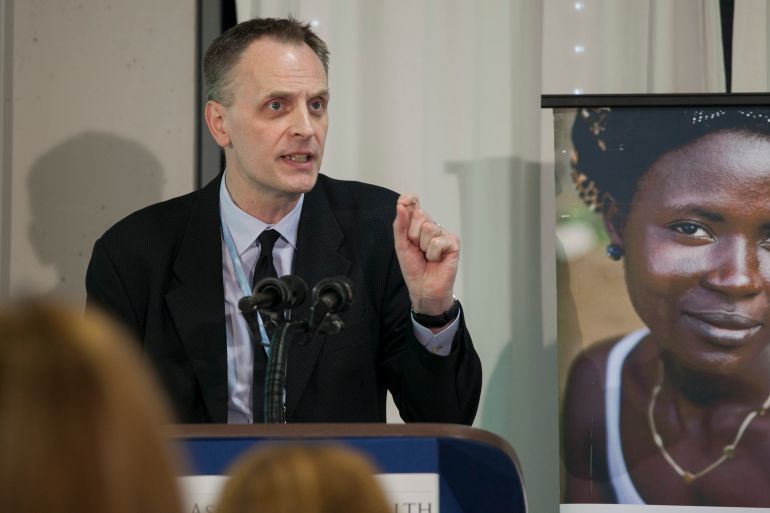The Lancet editor: UK ‘steadfastly refused to follow the science’
As the UK struggles to contain the coronavirus crisis, Richard Horton says the government should have implemented strict lockdowns as soon as infections rose.

England was plunged into its third national lockdown due to the coronavirus pandemic a week ago, with the whole of the UK now under strict social distancing controls as it struggles to contain a variant of COVID-19 that spreads faster.
The United Kingdom registered 59,940 confirmed cases and 563 deaths on Sunday, bringing the overall toll to more than 81,000.
Keep reading
list of 4 itemsUK coronavirus cases top 3 million as death toll passes 80,000
Vaccines may not work against SA virus variant, UK minister warns
UK approves Moderna’s COVID-19 vaccine for use
London mayor Sadiq Khan has declared a “major incident” in London, the epicentre of the UK’s outbreak, with hospitals in the capital struggling to cope with patient numbers.
Richard Horton, editor-in-chief of The Lancet, one of the oldest and most prestigious medical journals in the world, talks to Al Jazeera about the crisis.

Al Jazeera: Why is the UK struggling to contain the coronavirus pandemic?
Richard Horton: The primary reason why the UK has struggled is because it has not learned the lessons of the first wave of the pandemic in 2020 and it has steadfastly refused to follow the science, despite claims that it is doing so.
The lessons from the science have been that when there is a rise in infections, you need to clamp down immediately to suppress transmission to reduce the prevalence of infection in the community. But at every stage, the government has delayed and delayed and delayed locking down, with the result that the virus has got out of control.
The result of that is increased hospitalisations and deaths. This has been entirely preventable if the government had acted with more decisiveness, and sooner.
I think that the Prime Minister [Boris Johnson] has been appeasing a small group of MPs, who are vehemently libertarian and anti-lockdown – a group of MPs who simply do not understand the impact of this pandemic on people’s lives. And it is the same strategy of appeasement that is used in dealing with Brexit that he’s now using to deal with this pandemic. It’s entirely political.
Al Jazeera: What should the government have done differently?
Horton: If we start off with last year, the evidence that was presented by SAGE [the government’s Scientific Advisory Group for Emergencies] to ministers, about the overwhelming threat of the pandemic was in early March, and yet it took till March 23 until a lockdown was announced.
That period of two to three weeks allowed the pandemic to get completely out of control, with the result that there were tens of thousands of needless deaths.
We’re now in exactly the same position, when it was clear in December, before we even understood about the new variants, that we were threatened with a resurgence in the pandemic. SAGE and Independent SAGE were both recommending urgent and decisive government actions. The government refused to act; indeed they planned to loosen restrictions over Christmas.
And then just before the holiday, we have this new variant, but still, it took until the first week of January for the government to announce a lockdown. Again, we wasted at least three weeks when we should have had a much more active policy of suppressing community transmission of the virus. So again, we’ve lost time. And as a result, we’re going to go into January, with the National Health Service (NHS) under the real threat from overload.
Al Jazeera: Are the government’s future plans reasonable?
Horton: It’s ridiculous what Johnson is saying about coming out of lockdown in mid-February. If you look at the time course of what’s going to happen over the next three months or so, you can work it out based on what happened in the spring of last year. We would expect if this lockdown is implemented effectively and the public support it, that there will be a peak in the number of deaths towards the end of January this year, probably around January 22, and then there will be a gradual decline. It took until July 4 last year until pubs, restaurants, hairdressers, and so on, were opened and until households were allowed to mix. So that was March 23 to July 4.
If you apply the same period from January 6 when [the most recent] lockdown was implemented, that takes us to April 14. So I would predict, despite the fact that we’re trying to immunise millions of people, that it’s going to take us beyond Easter before we’re going to be able to lift the lockdown restrictions. And the situation is worse now than it was last spring because we’re in winter and we have a more transmissible virus. So this talk of well, ‘We get to February the 15th, and we’ll be able to ease the lockdown’. This is absolute nonsense.
We should be managing public expectations far better than we’re doing. Because if you, once again, over promise and under deliver, this is what erodes public confidence and public trust. And the lesson we learn from the Dominic Cummings episode is that as soon as you undermine public trust, people do not follow the advice of the government. The unnecessary damage is measured in the number of people who have died needlessly, and in long COVID in the very large number of people who had the infection and who have residual health problems. And that proportion could be as much as 30, 40, 50 percent of people who’ve been infected with COVID.
Al Jazeera: Would you say the UK government has failed ethnic minorities during the pandemic?
Horton: I think it’s important to recognise that this pandemic is a synthesis of epidemics. It’s a virus combined with a chronically unhealthy population, and it thrives on inequality. And so people who are towards the bottom end of the social gradient, those people who are living in poor housing, are not earning very much money, depend upon the welfare system, they are particularly at risk of this virus. That includes Black, Asian, minority ethnic communities. Because the government does not prioritise inequality in its social policy, and still isn’t prioritising inequality, as far as I can see, that is leaving millions of people vulnerable to further waves of the pandemic.
The point about inequality is that in order to address the pandemic, it’s not just about the virus, it’s about the state of your society. And if your society is fundamentally unequal, then you’re leaving the most marginalised, the most excluded people at biggest risk of harm to their health, and that’s the situation still today, the government has no strategy to deal with inequality, which is the most important social determinant of the outcome of infection.
But then the legacy also extends to children. Children have missed so much school that they’re now at least six months behind where they should be in terms of schooling. And we’re now in a situation where they’re going to fall further behind – the digital divide across the country means that inequalities are being worsened by the pandemic for children. It’s a real existential crisis for a new generation.
Al Jazeera: How concerned should we be about the new variant?
Horton: I think we should be very concerned about the mutations in the UK, the variant B117, which is surprisingly divergent from the original version of the virus. And it is a cause for concern with the vaccine because several of the mutations are occurring in that part of the virus which is extremely important for protective immunity. The South Africa variant is potentially even more worrying. And so I think the government has been right to try and protect our borders more aggressively. So yes, I am very concerned the virus is mutating, and it’s mutating in ways that threaten the efficacy of a vaccine and our ability to keep the pandemic under control.
There’s no question that the UK among Western countries is leading in terms of vaccine implementation. And I think that’s a great start to have immunised well over a million people already, at the beginning of the year, is a massive achievement by the NHS, and we need to see that continue. I have one concern, and that again is around managing expectations. The government has set February 15 as the goal to immunise over 14 million people in the top groups identified by JCVI [Joint Committee on Vaccination and Immunisation]. That means we’re going to have to be immunising over 350,000 people every day, two-and-a-half-million people every week to get to that number by the middle of February.
That is a huge, huge ask. It’s going to stress the system at a time when already the winter pressures on the NHS are massive. We must be very careful not to over promise and under deliver. I would rather that we have a steady ramping up of the vaccination schedule, rather than rushing it, and stumbling and failing to meet public expectations. And remember that even when we get to February 15, even if we were able to immunise 14 million people by then, those aren’t the only categories in the JCVI list. There are still an additional 16 million people, people over the age of 50, who need to be immunised. So the total number that JCVI is identifying is over 30 million people. This has never been done in any country at this scale, or at this speed. We mustn’t underestimate the logistical challenges that we face here.
Al Jazeera: How would you characterise the UK’s anti-vaccine movement, and what can be done to solve this issue?
Horton: I don’t see the anti-vaccination movement in the United Kingdom making any significant headway. It’s a very small group. And it does not seem to be having a big influence on the wider general population. I think the anti-vaccination movement is much more powerful in countries like the United States, France and elsewhere, but in the UK, it’s very much a fringe group. And I don’t see it playing an important part in obstructing vaccine rollout.